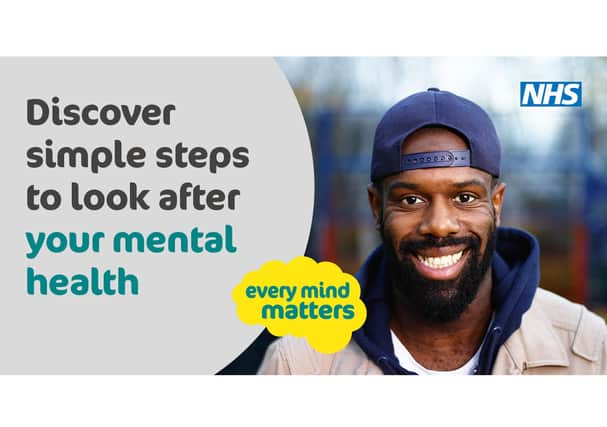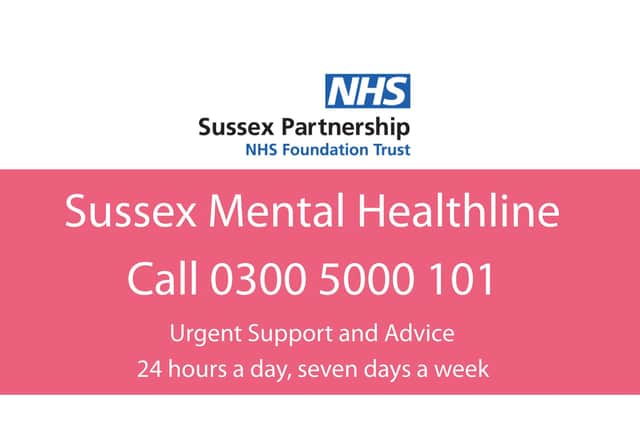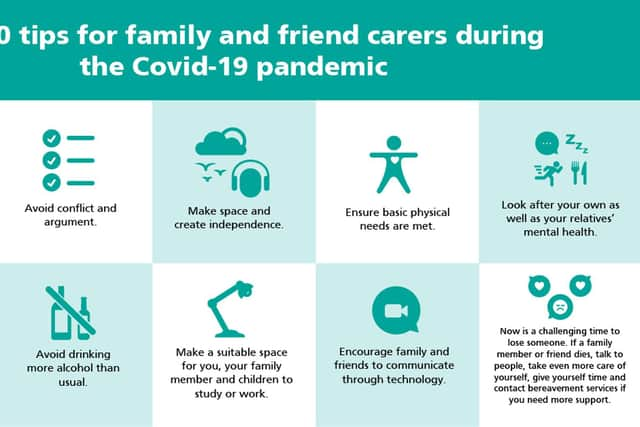How to help the NHS help you get the care you need to support your mental health


New research has revealed that nearly half of the public have concerns about seeking help from the NHS during the coronavirus pandemic.
The NHS is continuing to work hard to respond to coronavirus, but we’re also working hard to ensure patients can safely access essential support and services to look after your mental health during this time.
You don’t need to wait until you are struggling to seek support. Discover simple steps to look after your own wellbeing and build a personal action plan to deal with stress and anxiety, boost your mood, improve your sleep and help you feel more in control at www.nhs.uk/oneyou/every-mind-matters.


The website provides useful resources to help you spot signs of common mental health concerns, offering practical self-care tips and guidance, and explains when to seek further support.
Additional support is being offered
People across Sussex struggling with their mental health during the coronavirus outbreak are being offered additional telephone and crisis support.
Sussex Partnership NHS Foundation Trust has expanded the Sussex Mental Healthline - 0300 5000 101 - to provide a 24/7 service to people needing urgent help with their mental health. As well as crisis support, it provides psychological support to people with general concerns about their mental health.


Registered clinicians are at the other end of the phone to provide help, support and advice to anyone who needs it, at any time of the day or night, regardless of their age or where they live in the county.
The team at the Sussex Mental Healthline can offer advice and support to callers who are experiencing a crisis in their mental health, and if needed they can refer them to one of five newly-created urgent help hubs for assessment and treatment.
Dr Rick Fraser, Chief Medical Officer at Sussex Partnership, said: “We know the coronavirus outbreak is affecting people in different ways, and it is important that anyone experiencing a crisis in their mental health knows where to turn for help.
“We’ve increased the number of specially-trained mental health staff available to take calls on the Sussex Mental Healthline. If you have any concerns about your mental health, or that of a friend or loved one, you can call and ask for help and advice at any time of the day or night. And if additional care and treatment is needed the team can refer you on for urgent help.
“We hope that offering this additional support through the Sussex Mental Healthline will help people experiencing a mental health crisis access the help they need at the right time, and that we can help to alleviate some of the pressure on other local health and care services as we all respond to keep patients safe during the coronavirus pandemic.”
Advice about how to manage your mental health during the coronavirus outbreak is also available at www.sussexpartnership.nhs.uk/coronavirus
New service launched for young people
Do you know a young person that is struggling with their wellbeing or mental health? Perhaps the pressure and anxiety created by coronavirus has exacerbated underlying issues.
Www.e-wellbeing.co.uk is a new service, delivered by YMCA DownsLink Group, for young people in Sussex.
It provides advice, support and a clear pathway to local services for any young person in need. E-wellbeing is different to other websites in that it poses a series of questions to help guide young people to the appropriate content.
It provides young people with self-help guidance and information about different aspects of mental health difficulties and supports them to make the decision about whether they may need help from a professional service.
Crucially, they will then be connected with information about services in their local area.
Young people were involved in developing the service and testing it at each stage. Cat Pritchard, Wellbeing and Therapeutic Services Manager and Digital Lead at YMCA DownsLink Group, explains how the new service works and why it is different to other wellbeing websites: “This website works to simplify the process of accessing the right help, in the right place, at the right time.
“Local services have worked incredibly hard to adapt their offers so they can continue to meet the needs of young people remotely. Now, more than ever, it’s so important that young people know there is support available to them and that there are lots of different ways they can help themselves and their peers.”
Dr Rick Fraser, Chief Medical Officer at Sussex Partnership NHS Foundation Trust, which provides specialist mental health services to people of all ages in Sussex, says: “We are living in a time of unprecedented change around COVID-19, a time when just about every part of our lives seem very different to how they were only a few weeks ago and a time when our usual sources of support, communication and connecting may not be there.
“For young people this can lead to feeling isolated, frightened and stressed which can lead to mental health problems. What I like about the digital platform for young people is that it provides a virtual place for them to access good quality information, support and link with others in a way that is safe and managed.
“This is an innovation that works in COVID-19 times but should also work well in times beyond.”
“It was really supportive”
Pete* was feeling anxious and suffering from low mood at the start of lockdown and accessed support from his local mental health and wellbeing team.
He used the website to self-refer and was recommended an online wellbeing course, which he could complete at his own pace.
Pete said: “I have been feeling anxious with everything that is going on, so I have been reading and following the courses. I have completed the Space for Resilience [course] and I found it really supportive.
“It was straightforward to access through the website, I could dip in and out of the course and I reconnected with looking after myself and improving my self-compassion.
“There was clear and concise information and the personal stories on the course made it real. I liked that there was mindfulness throughout the course, as I practice mindfulness daily and the course body scan exercises were lovely – the speaker had a very calming accent and voice.
“I was able to take part in the range of exercises, but did not feel pressured to complete them. After saving them, it was helpful to go back and read what I had written. I will be going back in to look at the other two modules as it was great. I have sent the link to my colleagues as some are [also] feeling anxious.”
We all experience low points at times in our lives and it’s not unusual to feel sad, anxious, stressed or low in mood.
If you feel you may need support - whether that’s through an online course like Pete* benefitted from, or through one-on-one counselling sessions - you can self-refer to your local free NHS service by visiting:
Brighton and Hove www.brightonandhovewellbeing.org/
East Sussex www.healthinmind.org.uk
West Sussex www.sussexcommunity.nhs.uk/services/
time-talk-service/
Once a referral has been received, the team will have a conversation with you about what can be offered based on your individual needs.
*Not his real name